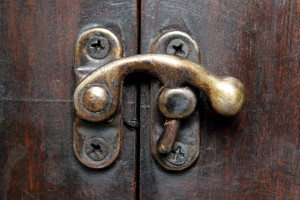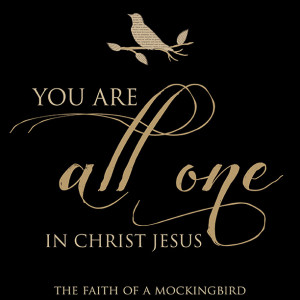I would like to share a few words in response to J.D. Walt’s “8 More Reasons the Middle Way is the Wrong Way.”
I often offer my congregation to meet a dichotomy with quick suspicion. There is never only two options when walking with Christ. Walt references Matthew 7 where Jesus says:
Watch out for false prophets. They come to you in sheep’s clothing, but inwardly they are ferocious wolves. By their fruit you will recognize them. Do people pick grapes from thornbushes, or figs from thistles? Likewise, every good tree bears good fruit, but a bad tree bears bad fruit. A good tree cannot bear bad fruit, and a bad tree cannot bear good fruit. Every tree that does not bear good fruit is cut down and thrown into the fire. Thus, by their fruit you will recognize them (Matthew 7:15-20).
Jesus, later in Matthew, tells a parable about the judgment of nations. Some do good works according to God’s will and others do not. Those who do kingdom work are counted as sheep and sit at God’s right hand. The others, the goats, are cast out and are not able to enter into the kingdom. It certainly sounds like we are dealing with a narrow path that leads to life and a broad path leading to sin and destruction, a “this” or “that” way of following our Lord, but there’s more here than a lesson in being a sheep rather than a goat.
Some might say that seeing the world as either a narrow path of righteousness or a broad path of destruction makes things simple and easy. Actually seeing the world in strict duality is devastatingly complicated. If I commit a sin, any sin, fill in the blank, does that mean that I am on the broad path until I confess and am pardoned? What about the sins of which I am unaware? If I fail to feed the hungry today, does that nullify my walk? Where do you draw the line? Now, before you label me as a “to each his own,” kind of guy, hear me. Here’s the mystery: It’s not that we are either on this path or that; rather we are on both. This is why we daily need to confess and seek pardon. The wheat and the chaff grow together. At the time of judgment the times I served and loved are remembered and continue on in God’s heart. The times I turned away and forgot the least and the lost, the chaff that is within me, is thrown into the fire. By the way, you need fire in order to make bread. The problem is when the fire’s too hot, the bread burns and cannot be broken at the table with the wine outpoured. Please hear me! I am not saying that we should look for ways to create a little chaff. The sins I commit unawares will be plenty to stoke the oven. Go out and work to produce wheat!
And the slaves of the householder came and said to him, “Master, did you not sow good seed in your field? Where, then, did these weeds come from?” He answered, “An enemy has done this.” The slaves said to him, “Then do you want us to go and gather them?” But he replied, “No; for in gathering the weeds you would uproot the wheat along with them. Let both of them grow together until the harvest; and at harvest time I will tell the reapers, Collect the weeds first and bind them in bundles to be burned, but gather the wheat into my barn” (Matthew 13:27-30).
So, first, we have to be careful when we look at divisions in the church through eyes of “the straight and narrow” or “the highway to hell.” Secondly, and maybe more importantly, I have found that when folks draw a line between us and them, they typically draw the line so that they themselves are “in,” so to speak. Being more progressive (what does that even mean anymore, right?) I could say that the narrow path IS the path that I’m following through an ethic of salvific love that goes over and above our biology. For example, here are two of Walt’s steps, and seriously . . . be fair. Go and read his entire post.
1. The middle way offers a license to broaden the narrow way in the name of being more loving. The narrow way is actually willing to be completely marginalized and endure public execution as an act of love.
To say that full inclusion is the way of being marginalized and publicly executed certainly seems to fit.
5. The middle way tends to deduce its reasoning from the basis of human experience in order to bully tradition into departing from truth. The narrow way reasons that truth is the voice of love.
That’s what I’m saying! Our history of human experience has shunned our homosexual brothers and sisters, but the voice of love should be our ethic. Right on!
Look. I’m not writing to poke fun or to be disrespectful. What I’m saying is this discourse doesn’t really get us anywhere. Those on the left and the right will both claim to be on the narrow path, and those with whom they disagree will be on the broad path to Hell. All this gets us is lots of narrow paths leading to the reflection in our bathroom mirror.
Yes there is a Third Way. There is life, there is death, and there is Resurrection. Resurrection helps us realize that the line between the sheep and the goats is drawn through each of us, not between me and my neighbor. In other words, Peter and Paul argued about whether or not one should be circumcised. This disagreement almost stopped the church before it started. Then the church realized that circumcision is a matter of the heart, not rooted in someone’s flesh. Both the circumcised and uncircumcised can both be on the path of righteousness.
 This Starbucks red cup thing needs no more press (yeah, so here’s a blog post about it . . . smooth). Some are upset that Starbucks’ holiday disposable cup doesn’t saying anything about Christmas. I would hope that Christians are too busy with doing the things Jesus said to do as he read from the scroll of Isaiah (Luke 4) to worry about cardboard graphics, but with that said, here are my top five things to think about.
This Starbucks red cup thing needs no more press (yeah, so here’s a blog post about it . . . smooth). Some are upset that Starbucks’ holiday disposable cup doesn’t saying anything about Christmas. I would hope that Christians are too busy with doing the things Jesus said to do as he read from the scroll of Isaiah (Luke 4) to worry about cardboard graphics, but with that said, here are my top five things to think about.







